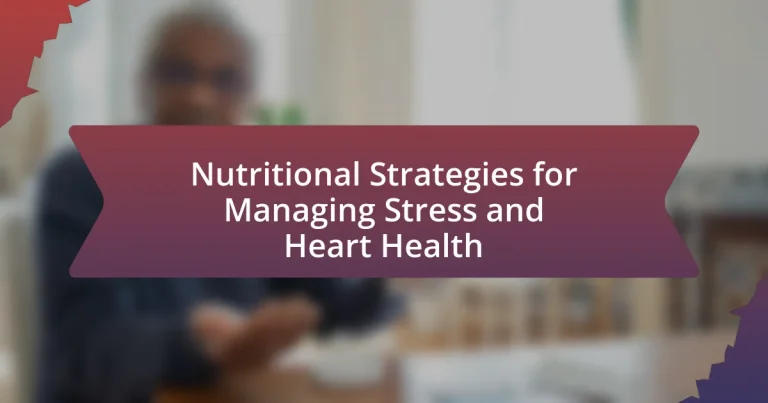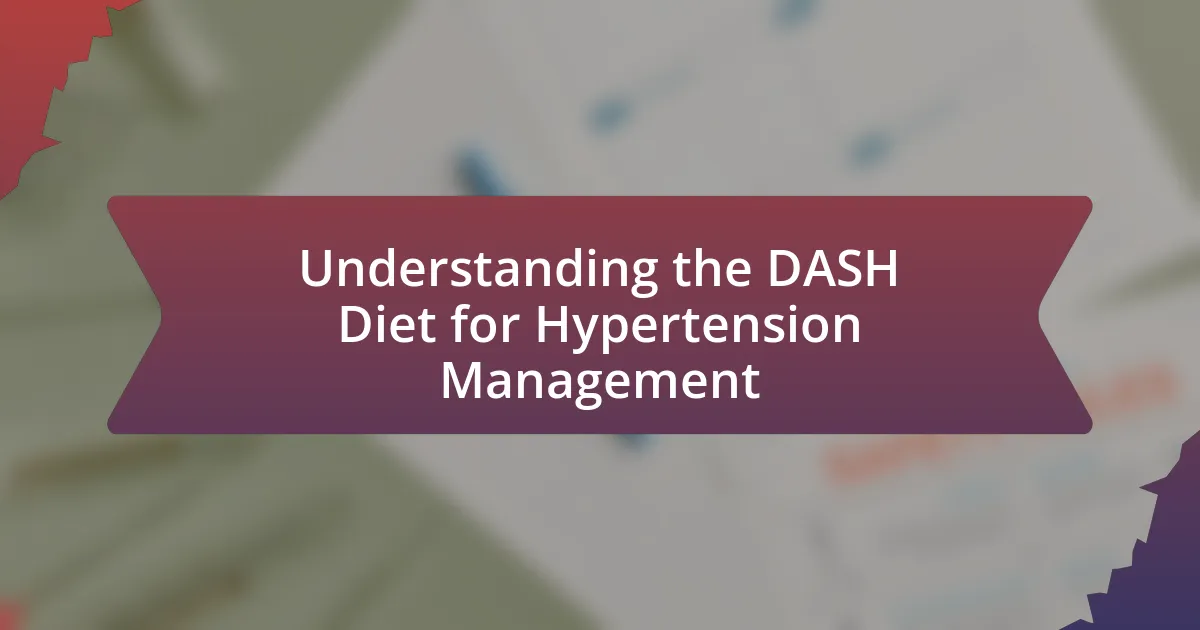Nutritional strategies for managing stress and heart health emphasize the importance of a balanced diet rich in fruits, vegetables, whole grains, lean proteins, and healthy fats. Key nutrients such as omega-3 fatty acids, magnesium, and B vitamins play significant roles in reducing stress and supporting cardiovascular function. Hydration is also crucial, as it impacts stress levels and overall well-being. The article explores how specific dietary patterns, such as the Mediterranean and DASH diets, contribute to heart health while highlighting the negative effects of processed foods and sugars on stress and cardiovascular risk. Additionally, practical tips for meal planning and portion control are provided to aid in maintaining both stress management and heart health.
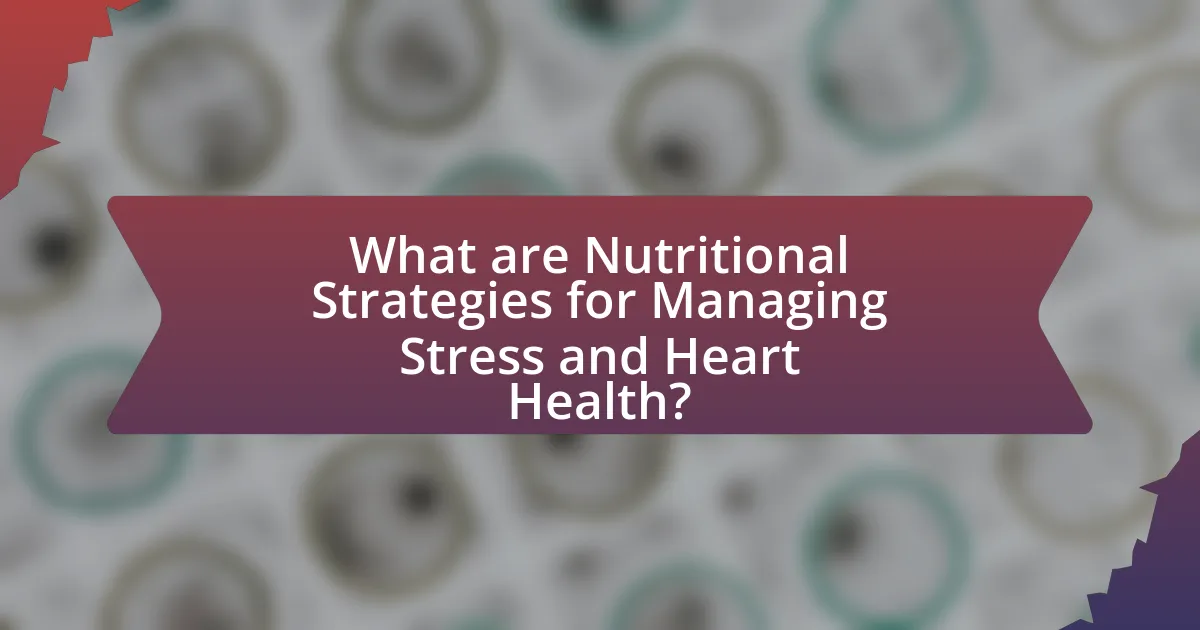
What are Nutritional Strategies for Managing Stress and Heart Health?
Nutritional strategies for managing stress and heart health include consuming a balanced diet rich in fruits, vegetables, whole grains, lean proteins, and healthy fats. These foods provide essential nutrients that support cardiovascular function and help regulate stress hormones. For instance, omega-3 fatty acids found in fish and flaxseeds have been shown to reduce inflammation and lower blood pressure, contributing to heart health. Additionally, magnesium-rich foods like nuts and leafy greens can help alleviate stress by promoting relaxation and reducing anxiety levels. Research indicates that diets high in antioxidants, such as those found in berries and dark chocolate, can also improve mood and cognitive function, further supporting heart health.
How do nutrition and diet influence stress levels?
Nutrition and diet significantly influence stress levels by affecting brain chemistry and hormonal balance. A diet rich in whole foods, such as fruits, vegetables, whole grains, and lean proteins, provides essential nutrients that support neurotransmitter function and reduce inflammation, both of which are linked to stress management. For instance, omega-3 fatty acids found in fish have been shown to lower cortisol levels, a hormone associated with stress. Additionally, studies indicate that deficiencies in vitamins such as B vitamins and minerals like magnesium can exacerbate stress responses. Therefore, a balanced diet not only helps in maintaining physical health but also plays a crucial role in regulating emotional well-being and stress levels.
What specific nutrients are linked to stress reduction?
Magnesium, omega-3 fatty acids, and B vitamins are specific nutrients linked to stress reduction. Magnesium helps regulate cortisol levels, which is a hormone associated with stress; studies show that adequate magnesium intake can lower anxiety and improve mood. Omega-3 fatty acids, found in fish and flaxseeds, have been shown to reduce symptoms of anxiety and depression, with research indicating that they can lower stress-related inflammation. B vitamins, particularly B6, B9 (folate), and B12, play crucial roles in neurotransmitter function and can help alleviate stress by supporting brain health and mood regulation.
How does hydration impact stress management?
Hydration significantly impacts stress management by influencing physiological and psychological responses to stress. Adequate water intake helps maintain optimal brain function, which is crucial for emotional regulation and stress response. Research indicates that even mild dehydration can lead to increased levels of cortisol, the stress hormone, thereby exacerbating feelings of stress and anxiety. A study published in the Journal of Nutrition found that participants who were dehydrated reported higher levels of tension and fatigue compared to those who were well-hydrated. This evidence underscores the importance of hydration in managing stress effectively.
What role does diet play in heart health?
Diet plays a crucial role in heart health by influencing cholesterol levels, blood pressure, and overall cardiovascular risk. A diet rich in fruits, vegetables, whole grains, and healthy fats, such as those found in fish and nuts, can lower the risk of heart disease. For instance, the American Heart Association recommends a diet low in saturated fats, trans fats, and sodium to promote heart health. Studies have shown that adhering to a Mediterranean diet, which emphasizes these food groups, is associated with a reduced incidence of heart disease. Additionally, research indicates that diets high in fiber can help lower LDL cholesterol levels, further supporting cardiovascular health.
Which dietary patterns are most beneficial for heart health?
The dietary patterns most beneficial for heart health include the Mediterranean diet, DASH (Dietary Approaches to Stop Hypertension) diet, and plant-based diets. The Mediterranean diet emphasizes fruits, vegetables, whole grains, nuts, and healthy fats, particularly olive oil, which has been associated with a reduced risk of cardiovascular disease. Research published in the New England Journal of Medicine found that adherence to the Mediterranean diet significantly lowered the incidence of major cardiovascular events among high-risk individuals. The DASH diet focuses on reducing sodium intake while promoting the consumption of potassium-rich foods, which has been shown to lower blood pressure and improve heart health. A study in the Journal of the American College of Cardiology demonstrated that the DASH diet effectively reduces hypertension and improves overall cardiovascular health. Plant-based diets, rich in whole foods and low in processed foods, have also been linked to lower cholesterol levels and reduced heart disease risk, as evidenced by findings in the American Journal of Clinical Nutrition, which highlighted the protective effects of plant-based eating patterns on heart health.
How do specific foods affect cardiovascular health?
Specific foods significantly impact cardiovascular health by influencing cholesterol levels, blood pressure, and inflammation. For instance, foods high in saturated fats, such as red meat and full-fat dairy, can raise LDL cholesterol, increasing the risk of heart disease. Conversely, foods rich in omega-3 fatty acids, like fatty fish and walnuts, can lower triglycerides and reduce inflammation, promoting heart health. Additionally, fruits and vegetables, which are high in antioxidants and fiber, have been shown to lower blood pressure and improve overall cardiovascular function. Research published in the Journal of the American College of Cardiology indicates that a diet rich in plant-based foods can reduce the risk of cardiovascular events by up to 30%.
What is the connection between stress and heart health?
Stress negatively impacts heart health by increasing the risk of cardiovascular diseases. When an individual experiences stress, the body releases hormones such as cortisol and adrenaline, which can lead to elevated heart rate and blood pressure. Chronic stress contributes to inflammation and can result in unhealthy behaviors like poor diet and lack of exercise, further exacerbating heart issues. Research indicates that individuals with high stress levels are more likely to develop conditions such as hypertension and heart disease, highlighting the critical link between stress management and cardiovascular health.
How does chronic stress impact heart function?
Chronic stress negatively impacts heart function by increasing heart rate and blood pressure, which can lead to cardiovascular diseases. Prolonged exposure to stress hormones, such as cortisol, contributes to inflammation and arterial damage, increasing the risk of heart attacks and strokes. Research indicates that individuals experiencing chronic stress are more likely to develop heart disease, with studies showing that stress can elevate the likelihood of coronary artery disease by 40%.
What are the physiological mechanisms linking stress and heart disease?
Stress contributes to heart disease through several physiological mechanisms, primarily involving the autonomic nervous system, hormonal responses, and inflammatory processes. When an individual experiences stress, the body activates the sympathetic nervous system, leading to increased heart rate and blood pressure. This response is mediated by the release of stress hormones such as cortisol and adrenaline, which can cause long-term damage to the cardiovascular system if persistently elevated.
Additionally, chronic stress promotes inflammation, which is a key factor in the development of atherosclerosis, the buildup of plaques in the arteries. Studies have shown that individuals with high stress levels exhibit elevated markers of inflammation, such as C-reactive protein, which correlates with an increased risk of heart disease. Furthermore, stress can lead to unhealthy behaviors, such as poor diet and lack of exercise, which further exacerbate cardiovascular risk.
Research indicates that managing stress through nutritional strategies can mitigate these physiological effects, thereby supporting heart health. For instance, diets rich in omega-3 fatty acids, antioxidants, and fiber have been shown to reduce inflammation and improve heart function, highlighting the interplay between stress management and nutritional choices in cardiovascular health.
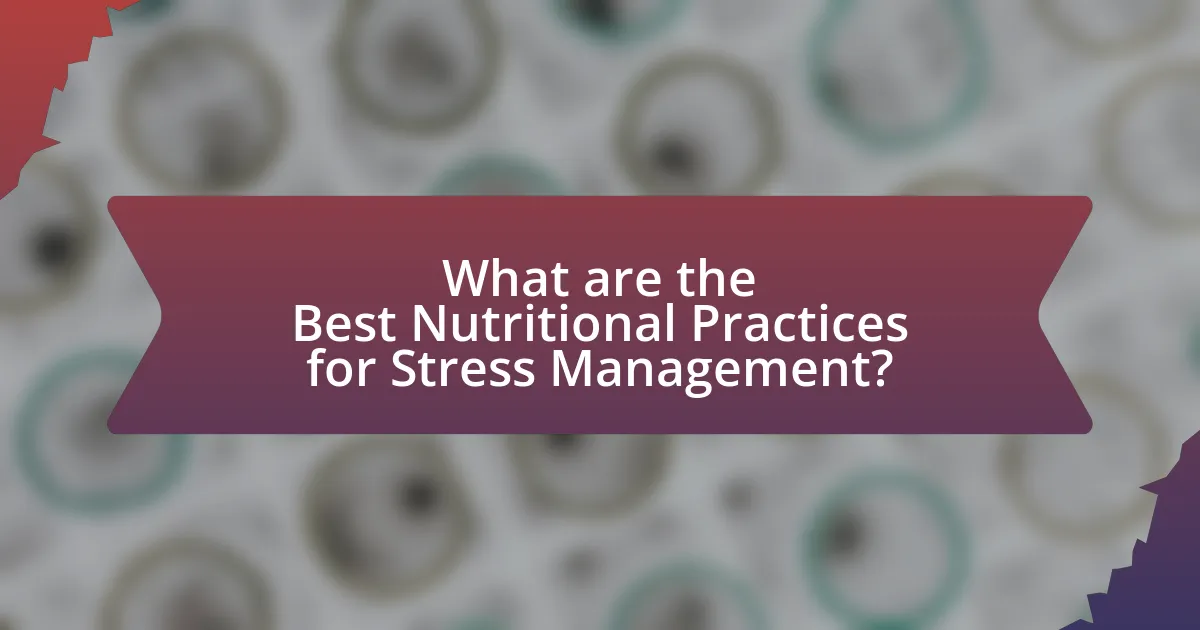
What are the Best Nutritional Practices for Stress Management?
The best nutritional practices for stress management include consuming a balanced diet rich in whole foods, incorporating omega-3 fatty acids, and maintaining hydration. A balanced diet that emphasizes fruits, vegetables, whole grains, lean proteins, and healthy fats supports overall mental health and reduces stress levels. Omega-3 fatty acids, found in fatty fish like salmon and walnuts, have been shown to lower anxiety and improve mood, as evidenced by a study published in the journal “Nutritional Neuroscience,” which found that omega-3 supplementation significantly reduced anxiety symptoms. Additionally, staying hydrated is crucial, as dehydration can lead to increased cortisol levels, the hormone associated with stress. Therefore, these nutritional practices collectively contribute to effective stress management.
How can a balanced diet help in managing stress?
A balanced diet can help in managing stress by providing essential nutrients that support brain function and emotional well-being. Nutrients such as omega-3 fatty acids, found in fish, and antioxidants, present in fruits and vegetables, have been shown to reduce inflammation and improve mood. For instance, a study published in the journal “Nutritional Neuroscience” found that individuals with higher omega-3 intake reported lower levels of anxiety and depression. Additionally, complex carbohydrates, like whole grains, can stabilize blood sugar levels, preventing mood swings and irritability. Therefore, a balanced diet not only nourishes the body but also plays a crucial role in regulating stress levels.
What are the key components of a stress-reducing diet?
A stress-reducing diet primarily includes whole foods, omega-3 fatty acids, antioxidants, and hydration. Whole foods, such as fruits, vegetables, whole grains, and lean proteins, provide essential nutrients that support overall health and reduce stress levels. Omega-3 fatty acids, found in fatty fish like salmon and walnuts, have been shown to lower anxiety and improve mood. Antioxidants, present in berries, dark chocolate, and green tea, combat oxidative stress, which can exacerbate feelings of anxiety. Adequate hydration is also crucial, as dehydration can lead to increased cortisol levels, the hormone associated with stress. Studies indicate that diets rich in these components can significantly lower stress and improve mental well-being.
How often should meals be consumed to manage stress effectively?
Meals should be consumed every three to four hours to manage stress effectively. This frequency helps maintain stable blood sugar levels, which can reduce stress and anxiety. Research indicates that irregular eating patterns can lead to fluctuations in blood sugar, potentially increasing stress levels. A study published in the journal “Nutritional Neuroscience” found that consistent meal timing is associated with improved mood and reduced stress responses. Therefore, regular meal consumption is crucial for effective stress management.
What foods should be avoided to reduce stress levels?
To reduce stress levels, individuals should avoid foods high in sugar, caffeine, and unhealthy fats. High sugar intake can lead to blood sugar spikes and crashes, which may increase anxiety and stress. Caffeine, found in coffee and energy drinks, can exacerbate stress by stimulating the nervous system and increasing heart rate. Unhealthy fats, particularly trans fats and excessive saturated fats, can negatively impact brain health and mood regulation. Research indicates that diets high in these components are linked to increased stress and anxiety levels, highlighting the importance of dietary choices in stress management.
How do processed foods and sugars affect stress?
Processed foods and sugars significantly increase stress levels by causing fluctuations in blood sugar and promoting inflammation. These foods often contain high levels of refined carbohydrates and added sugars, which can lead to rapid spikes and subsequent crashes in blood glucose, resulting in mood swings and irritability. Research indicates that diets high in processed foods are associated with increased levels of cortisol, the stress hormone, which can exacerbate feelings of anxiety and stress. A study published in the journal “Psychosomatic Medicine” found that individuals consuming a diet rich in processed foods reported higher stress levels compared to those with a whole-food diet.
What is the impact of caffeine on stress and anxiety?
Caffeine can increase stress and anxiety levels in some individuals. Research indicates that caffeine stimulates the central nervous system, leading to heightened alertness and increased heart rate, which can mimic or exacerbate anxiety symptoms. A study published in the Journal of Psychopharmacology found that high doses of caffeine can lead to increased anxiety sensitivity and panic attacks in susceptible individuals. Additionally, the American Psychological Association notes that caffeine consumption can lead to sleep disturbances, further contributing to stress and anxiety.
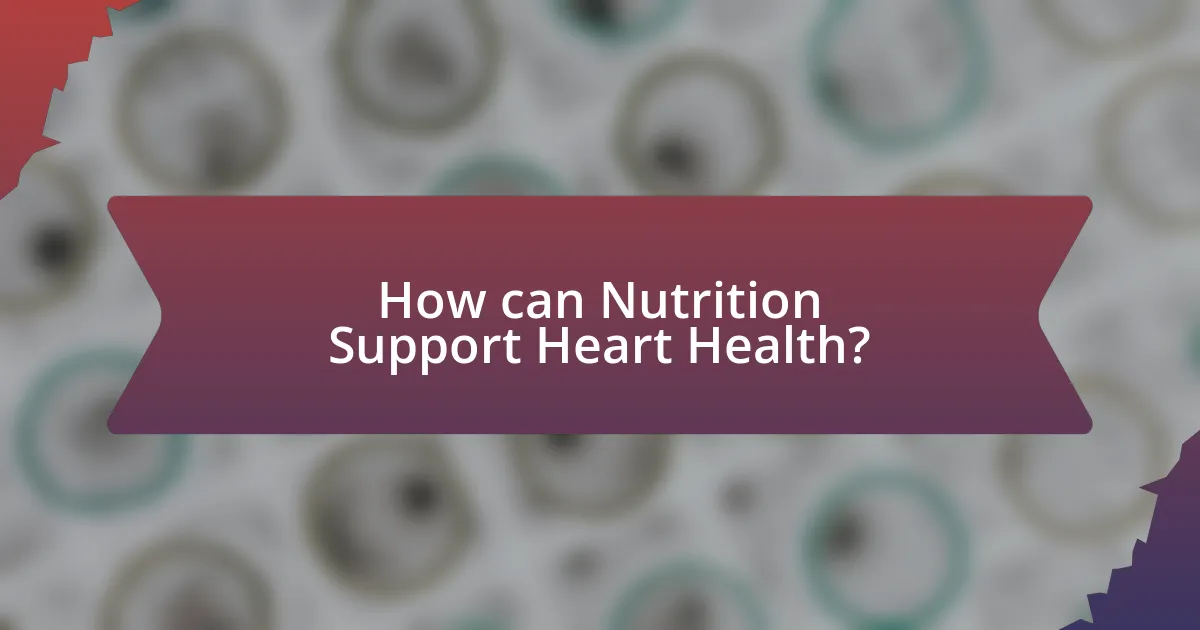
How can Nutrition Support Heart Health?
Nutrition supports heart health by providing essential nutrients that help maintain cardiovascular function and reduce the risk of heart disease. A diet rich in fruits, vegetables, whole grains, lean proteins, and healthy fats, such as omega-3 fatty acids found in fish, has been shown to lower blood pressure, reduce cholesterol levels, and improve overall heart health. For instance, the American Heart Association recommends consuming at least five servings of fruits and vegetables daily, which are high in antioxidants and fiber, contributing to heart health. Additionally, studies indicate that diets low in saturated fats and high in unsaturated fats can significantly decrease the risk of coronary artery disease.
What are the most heart-healthy foods to include in a diet?
The most heart-healthy foods to include in a diet are fatty fish, whole grains, fruits, vegetables, nuts, and legumes. Fatty fish, such as salmon and mackerel, are rich in omega-3 fatty acids, which have been shown to reduce the risk of heart disease by lowering triglycerides and blood pressure. Whole grains, like oats and brown rice, provide fiber that helps lower cholesterol levels. Fruits and vegetables are high in vitamins, minerals, and antioxidants, which contribute to overall heart health. Nuts, particularly walnuts and almonds, contain healthy fats and have been linked to improved heart health. Legumes, such as beans and lentils, are excellent sources of protein and fiber, promoting heart health by improving cholesterol levels and reducing blood pressure.
How do omega-3 fatty acids benefit heart health?
Omega-3 fatty acids benefit heart health by reducing inflammation, lowering triglyceride levels, and improving overall cardiovascular function. Research indicates that these fatty acids can decrease the risk of heart disease by lowering blood pressure and preventing the formation of arterial plaque. A study published in the Journal of the American College of Cardiology found that individuals who consumed omega-3 fatty acids regularly had a 30% lower risk of heart attack compared to those who did not. Additionally, the American Heart Association recommends omega-3 fatty acids as part of a heart-healthy diet, emphasizing their role in promoting heart health through various mechanisms.
What role do antioxidants play in cardiovascular health?
Antioxidants play a crucial role in cardiovascular health by neutralizing free radicals, which can cause oxidative stress and damage to blood vessels. This oxidative stress is linked to the development of atherosclerosis, hypertension, and other cardiovascular diseases. Studies have shown that diets rich in antioxidants, such as vitamins C and E, flavonoids, and polyphenols, can reduce inflammation and improve endothelial function, thereby lowering the risk of heart disease. For instance, a meta-analysis published in the Journal of the American College of Cardiology found that higher antioxidant intake is associated with a significant reduction in cardiovascular events.
How can meal planning contribute to heart health?
Meal planning can significantly contribute to heart health by promoting the consumption of nutrient-dense foods while reducing the intake of unhealthy options. By organizing meals in advance, individuals can prioritize fruits, vegetables, whole grains, lean proteins, and healthy fats, which are essential for cardiovascular health. Research indicates that diets rich in these foods can lower blood pressure, reduce cholesterol levels, and decrease the risk of heart disease. For instance, a study published in the Journal of the American College of Cardiology found that adherence to a Mediterranean diet, which emphasizes meal planning around heart-healthy foods, is associated with a 30% lower risk of cardiovascular events. Thus, effective meal planning directly supports heart health by fostering better dietary choices and overall nutritional balance.
What strategies can be used for heart-healthy meal prep?
Heart-healthy meal prep strategies include incorporating whole grains, lean proteins, healthy fats, and a variety of fruits and vegetables. Whole grains like quinoa and brown rice provide fiber, which can lower cholesterol levels. Lean proteins such as chicken, fish, and legumes support muscle health without adding excessive saturated fat. Healthy fats from sources like avocados, nuts, and olive oil can improve heart health by reducing inflammation. Additionally, including a colorful array of fruits and vegetables ensures a rich supply of antioxidants and essential nutrients that support cardiovascular function. Research indicates that diets rich in these components can significantly reduce the risk of heart disease, as evidenced by studies published in the Journal of the American College of Cardiology, which highlight the benefits of a balanced diet on heart health.
How can portion control aid in maintaining heart health?
Portion control aids in maintaining heart health by regulating calorie intake and promoting balanced nutrition. By consuming appropriate serving sizes, individuals can reduce the risk of obesity, which is a significant risk factor for heart disease. Studies indicate that maintaining a healthy weight through portion control can lower blood pressure and improve cholesterol levels, both of which are crucial for cardiovascular health. For instance, research published in the Journal of the American College of Cardiology found that individuals who practiced portion control had a 20% lower risk of developing heart disease compared to those who did not. This evidence underscores the importance of portion control as a practical strategy for supporting heart health.
What practical tips can be implemented for managing stress and heart health through nutrition?
To manage stress and heart health through nutrition, individuals should focus on incorporating omega-3 fatty acids, whole grains, fruits, vegetables, and reducing processed foods. Omega-3 fatty acids, found in fish like salmon and walnuts, have been shown to lower stress levels and improve heart health by reducing inflammation and lowering blood pressure. Whole grains, such as oats and brown rice, provide steady energy and help regulate mood, while fruits and vegetables are rich in antioxidants that combat oxidative stress. Additionally, reducing processed foods, which often contain high levels of sugar and unhealthy fats, can decrease the risk of heart disease and improve overall well-being. Studies indicate that diets rich in these nutrients are associated with lower levels of anxiety and better cardiovascular health, reinforcing the importance of nutrition in managing stress and heart health.
